

Developing ICT Skills in African Teachers. What guidance is there for countries across Africa that are 'computerizing' their schools (or planning to do so) to help ensure that teachers know how to use ICTs productively?
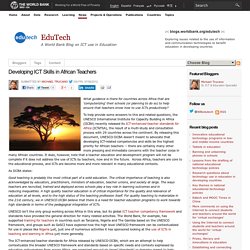
As IICBA states: Good teaching is probably the most critical part of a solid education. The critical importance of teaching is also acknowledged by educators, practitioners, ministers of education, teacher unions, and society at large. The ways teachers are recruited, trained and deployed across schools play a key role in learning outcomes and in reducing inequalities. A high quality teacher education is of critical importance for the quality and relevance of education at all levels, and to the high status of the teaching profession itself. UNESCO isn't the only group working across Africa in this area, but its global ICT teacher competency framework and standards have provided the general direction for many related activities.
(more information here, here, and here [pdf]) Teachers Are Central to ICT Enabled Educational Change. I am Russell Southwood of Smart Monkey TV and in July, I was at the How is ICT Impacting Education in Rwanda?
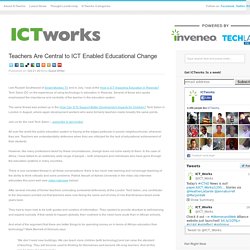
Tech Salon DC on the experience of using technology in education in Rwanda. Several of those who spoke emphasized the importance and centrality of the teacher in the education system. The same thread was picked up in the How Can ICTs Support Better Development Impacts for Children? Tech Salon in London in August, where again development workers who were formerly teachers made broadly the same points. Join us for the next Tech Salon – subscribe to get invited. All over the world the public education system is fraying at the edges particular in poorer neighbourhoods, wherever they are. However, like many professions faced by these circumstances, change does not come easily to them. There is one consistent thread in all these conversations: there is too much rote learning and not enough teaching of the ability to think critically and solve problems. “We don’t need new buildings.
eLearning Africa 2015 / International Conference on ICT for Development, Education and Training. Get your free copy The eLearning Africa Report provides a yearly snapshot of progress and perspectives in the field of technology-enabled learning across the continent.
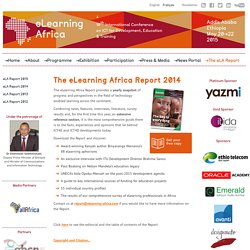
Combining news, features, interviews, literature, survey results and, for the first time this year, an extensive reference section, it is the most comprehensive guide there is to the facts, experiences and opinions that lie behind ICT4E and ICT4D developments today. Download the Report and discover: Award-winning Kenyan author Binyavanga Wainaina's 88 eLearning aphorisms An exclusive interview with ITU Development Director Brahima Sanou Paul Boateng on Nelson Mandela's education legacy UNECA's Aida Opoku-Mensah on the post-2015 development agenda A guide to key international sources of funding for education projects 55 individual country profiles The results of our comprehensive survey of eLearning professionals in Africa.
The use of ICT in Education: a comparison of traditional pedagogy and emerging pedagogy enabled by ICT’s. The use of ICT in Education: a comparison of traditional pedagogy and emerging pedagogy enabled by ICT’s Mbodila, Munienge¹ and Kikunga Muhandji² Science Foundation Unit - Computer Science, University of Venda, Private Bag X5050, Thohoyandou 0950, South Africa. 2.
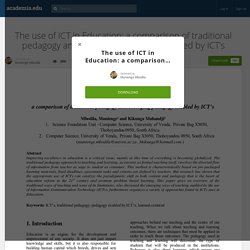
Computer Science, University of Venda, Private Bag X5050, Thohoyandou 0950, South Africa ( munienge.mbodila@univen.ac.za , bkikunga@hotmail.com ) Abstract Improving excellence in education is a critical issue; mainly at this time of everything is becoming globalized. St century and promote problem based learning. Keywords. 219521e.pdf. UNESCO Bangkok E-Learning Series on Information and Communication Technology (ICT) in Education. Click on the image to launch the course UNESCO Bangkok with funding support from Japanese-Funds-In-Trust (JFIT) has published an e-learning CD-ROM containing two modules.
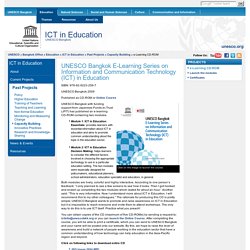
Module 1: ICT in Education Essentials: provides learners with essential information about ICT in education and aims to promote common understanding about the topic in the education sector. Module 2: ICT in Education Decision Making: helps learners to consider the different factors involved in choosing the appropriate technology to use in a particular education setting. The two modules were especially designed for policymakers, educational planners, school administrators, education specialist and educators, in general. Both modules are lively, colorful and highly interactive. You can obtain copies of the CD (maximum of five CD-ROMs) by sending a request to: ictinfo@unescobkk.org or you can launch the Online Course. Click on following links to download entire CD. ICT and Pedagogy. Africa for Norway.
Networks. Keep a research journal: it is important. Very few people I come across keep a research journal, they often don’t even know about the concept.
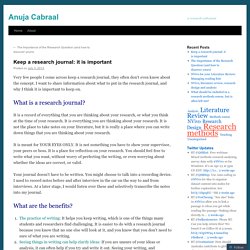
I want to share information about what to put in the research journal, and why I think it is important to keep on. What is a research journal? It is a record of everything that you are thinking about your research, or what you think at the time of your research. It is everything you are thinking about your research. It is not the place to take notes on your literature, but it is really a place where you can write down things that you are thinking about your research.
It is meant for YOUR EYES ONLY. Your journal doesn’t have to be written. What are the benefits?
Fun. Travel Plans. ICT4D.